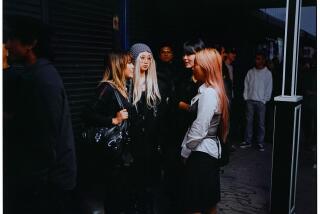Revolt of the ‘guest’
- Share via
During this last week, I was a guest at several Starbucks outlets, at a flagship store in the H&M; clothing chain, on a major airline with three inches more legroom in coach, and at a legendary gourmet grocery and takeout boutique. As in, “May I help the next guest in line?” “Would the next guest please step forward?” and “Thank you for being our guest today.”
I don’t know about your friends, but my friends never ask me to pay when they invite me over for a good time. “Guest” implies free, or at least it used to. Lately, “guest” seems to mean something new -- in return for paying for goods and services, we get the illusion of pleasant social interaction. No surly cuppa joe for a guest, no siree, but a customized, extra-hot, extra-dry, half-caff soy cappuccino served up with a smile, a little conversation and a polite “Thanks, have a nice day.”
We used to be “customers,” but now we’re “guests.” It makes me feel ever so slightly self-conscious, like I should’ve dressed better to stand in line.
That this is fake hospitality -- a conceit devised by a corporate host looking to lure customers -- is a given. In a world where all lattes are created pretty much equal, service is what drives consumer loyalty. The question, in the long run, is whether this is a good fake or a bad fake.
An optimist would say that it’s the start of a renaissance, that we are entering the golden age of courtesy, when “You’re welcome” regains its rightful place in the contemporary lexicon, knocking “No problem” right off the list. A gracious handshake will replace the high-five. People will hold doors open for each other. Never again will a motorist give another motorist the finger for not getting out of his way fast enough. Forget the dawning of the Age of Aquarius, which is so over. This is the Age of Community, and retailers are its pioneers.
Michael Gates Gill has written a book about his spiritual rebirth as a counter guy for Starbucks, after a soulless life in advertising, and he credits the McDonald’s of coffee with his transformation from capitalist jerk to genial host. While I haven’t yet had that kind of Oz experience at my local Peet’s, there are days when everybody on both sides of the cash register is into the game, and even a guest who cheaps out with a small drip coffee gets 30 seconds of happy banter.
But what if the “next guest” routine in fact diminishes the whole notion of inviting a friend to drop by; what if overuse turns guest-speak into the equivalent of the devalued “Hi, how are ya?” -- which people say reflexively, with no expectation of any reply longer than “Fine, how’re you?”
If you think I’m being cynical, try this: The next time someone asks you how you are, talk about your arthritis, or the guy who just dumped you, or your deep and abiding fear of various nuclear threats, and you’ll see just how surprised your questioner is. The next-guest version of civility may backfire, because it reduces sincerity to a platitude. Genuine politeness could go the way of the adverb and all but disappear.
After almost a week of being everyone’s welcome guest, I snailed my way down a sluggish line at the gourmet emporium, behind people with far too many questions about this brownie versus that brownie or the exact age of the apple fritter. My co-guests were not behaving all that well, which spoke to the central weakness of corporate-sponsored congeniality: There’s no way to address compatibility. People tend to have as guests other people they like, and really good hosts think long and hard about guests who will complement each other. But retail hosts have no control over who walks in the door. At any given moment, the get-together is either marvelously serendipitous (the line is moving) or painfully anarchic (the line is not moving). As I finally got within range of the cash register, I decided this was a party I might not want to attend again.
The cashier beckoned to me, the next guest, but she did not follow the script as she rang up my purchase. Instead, she gazed miserably down the endless late-afternoon line and wondered, loudly, why it wasn’t getting any shorter. A co-worker suggested, just as loudly, that it was because the cashier wasn’t doing her job fast enough.
She turned back to me, sullenly stuck out her hand and, like the overworked and underpaid clerks of yesteryear, told me exactly how much my coffee and roll cost without so much as a “See you next time.”
Made me feel welcome down to my very toes.
More to Read
Sign up for The Wild
We’ll help you find the best places to hike, bike and run, as well as the perfect silent spots for meditation and yoga.
You may occasionally receive promotional content from the Los Angeles Times.






